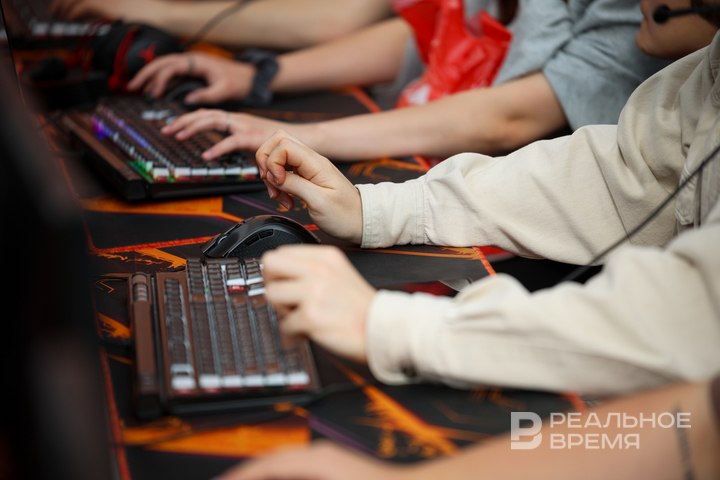How businesses are switching to domestic software: ‘Cheaper, but training eats up the savings’
Property developers, hoteliers, restaurateurs — who in Tatarstan was the first to master Russian software

Starting this year, all critical information infrastructure (CII) enterprises in Russia must switch to domestic software — that is, organisations of strategic importance to the economy and society. These include sectors such as healthcare, science, transport, communications, energy, banking, defence, and other industries. Most of those legally required to make the switch are complying and monitoring implementation within their subsidiaries. But for the rest of the business sector, it remains only a recommendation aimed at improving the reliability and resilience of IT infrastructure, and many entrepreneurs are in no rush to adopt Russian software. Realnoe Vremya looked into the reasons and also gathered the views of those who chose domestic products.
Domestic software is used in 90% of the restaurant business
The founder of the restaurant union MemSol (the cafés Skazka, Goryach Peremyach, Cuba Libre, among others) and chairman of the Association of Restaurateurs and Hoteliers of Tatarstan, Mikhail Sharipov, said that domestic software is currently used in 90% of the restaurant business. According to him, the industry has advanced significantly in this regard: “We never stopped using it and won’t stop, because our companies are ahead of the curve even on the global market — in terms of speed and quality, Iiko has long outpaced the likes of Microsoft. Although the former is now an international company, a leader in ERP systems. We are also actively adopting another developer — Welcome Pro and their product MOZG.”

Andrey Kuzmin, founder of the domestic women’s clothing brand Enevoo, said that until 2022 he had relied on a number of Western solutions, including Shopify. In his words, it was a convenient and intuitive platform, particularly when it came to handling international payments. However, following the imposition of restrictions, many foreign services became unstable or inaccessible, prompting him to fully transition to Russian software.
“Yes, when selling to Western countries, Shopify did offer greater flexibility. But today we no longer trade with Western markets, so Russian solutions fully meet our needs. We use entirely domestic systems: inventory is managed through MoySklad, our website is built on the Tilda platform and integrated with RetailCRM — this combination forms the backbone of our digital infrastructure. It covers customer records, order automation, and sales — all handled through specialised software tailored to retail. For working with marketplaces, we rely on Russian services Mpstats and Aurum. They help us track analytics, manage product ranges and pricing, and monitor competitors,” said Andrey Kuzmin.
“I don’t know a single hotel that has switched from OPERA PMS to a Russian programme”
Tatiana Ilchenko, director of Zorge Hospitality Management Company, said that foreign software is used in the hotel business — the Russian alternative remains vulnerable and falls short.

According to her, first of all, the cost of implementing such a system would run into millions; secondly, the hotel would lose all of its analytical data and detailed guest profiles, including stay history and preferences. “In the 3-star hotels under our management, we use Russian hotel systems. And if it weren’t for the cost, we would switch to OPERA PMS today. It’s difficult to compare the two — Western programmes offer a completely different level of reservation and guest management, automation of operational processes, and a top-tier financial analytics module. And the most important advantage is that in OPERA, no one can ever make backdated changes — not even with support’s help. All errors are corrected using the current date. This doesn’t eliminate, but significantly complicates any potential staff misconduct. There’s also a less obvious but major advantage: anyone who has worked in a chain hotel gains a lifelong bonus — knowledge of a hotel system used by hotels and other accommodation facilities around the world. Wherever life may take a person — even to a small town — there’s likely to be a chain hotel that will hire them because they know OPERA. That’s a very strong argument when it comes to competing for talent,” said Tatiana Ilchenko.
In hotels’ restaurants, there is a similar battle between Western and Russian software, the interviewee added. “And again, the main argument in favour of Western inventory and waste management programmes is the impossibility of making backdated changes. In all Russian programmes, accounting is very vulnerable — it is possible to falsify inventory, thereby distorting the true state of affairs and undermining the ability to make correct management decisions. Among the downsides of foreign inventory programmes is the difficulty of integration caused by changes in Russian legislation. For example, implementing systems like Chestny Znak and EGAIS with portion control is a headache for everyone involved in adapting foreign software,” she emphasised.
“Domestic software is cheaper, but staff training eats up the savings”
Nail Galeev, CEO of the SMU-88 group of companies, believes that it is currently extremely difficult to completely abandon foreign software in the construction industry. “We are actively switching to domestic software in management and accounting processes. However, the key challenge lies with project and engineering software. In construction, one of the core programmes remains AutoCAD and other Autodesk products. Their transition to a subscription model with mandatory online license verification has complicated operations in Russia. Like many in the industry, we used parallel import schemes for a time — for example, purchasing licenses through foreign agents. Today, this approach is almost exhausted: accounts are frequently blocked, and the stability of the software’s operation is in question,” he said.

As for Russian alternatives, solutions are indeed emerging on the market, particularly for the design of industrial facilities — these are already showing respectable results, the businessman noted. However, when it comes to residential property design, the functionality of such programmes is, in his opinion, still insufficient.
Therefore, the speaker emphasised that the question of whether switching is cost-effective cannot be assessed unequivocally: “On the one hand, domestic software is generally cheaper to licence, is not subject to sanction risks, and can be adapted to specific tasks. On the other hand, the costs of retraining staff, transferring and converting projects, and configuring new systems often eat up these savings. Therefore, the approach must be flexible and phased. We select areas where the switch is truly justified and does not affect the quality or deadlines of projects.”

“First, the product needs to be refined and compatibility tested”
Ildar Gilemkhanov, head of Simple, a resident company of the Nizhnekamsk industrial park producing polypropylene and polyethylene pipes and extrusion insulation, said he does not yet see an urgent need for import substitution with domestic software, nor does he face such a task. The company uses foreign software and is not exposed to information security risks. However, even if the enterprise wanted to switch to Russian software, it would be problematic, partly because it cannot be integrated with other systems.
“There is no easy way to switch to Russian software — it’s nowhere to be downloaded, it’s not advertised, and we know nothing about it. For now, we use convenient solutions like Microsoft Office. We are ready to switch to domestic software, but the main difficulty is whether we will be able to open files created in Word on computers with Russian software. Will we be able to run video editors on such software? Without confidence in proper functionality, such programmes are useless. The product needs to be refined, compatibility tested, and only then offered to business,” said Ildar Gilemkhanov.

Currently, software development in Tatarstan is actively carried out by Bars Group, Aurora, Innostage, and ICL.
“Active transition to domestic software in the banking sector”
Konstantin Zemlyakov, head of the commercial client department at Aurora’s Open Mobile Platform, confirmed that businesses are gradually switching to domestic software. For example, the federal retailer Lenta uses the company’s product for centralised remote management of its fleet of handheld terminals. Sales staff and warehouse employees at the hypermarket chain scan pallets, receive goods, and conduct inventory using devices running on the platform.
“This is an example of import substitution for discontinued MDM systems. Currently, domestic software is involved in critical business processes of one of the country’s largest retailers. To give a sense of scale: the chain’s stores operate nationwide, and the fleet of handheld terminals numbers several thousand devices. And this is just one example in the retail sector. The banking industry is also undergoing an active transition to domestic secure software,” Zemlyakov said.
In June, T-Bank launched Russia’s first remote biometric data collection service — data is gathered using a tablet running the company’s operating system and uploaded to the Unified Biometric System. The collection process takes from two minutes. The same operating system is used by state companies Russian Railways and Aeroflot, the spokesperson added.
Conductors of the Federal Passenger Company (FPC), a subsidiary of Russian Railways, use smartphones running a Russian operating system to check tickets, register passenger boarding, generate reports at the end of each trip, process orders placed by passengers through the Poputchik infotainment system, and more. Aeroflot’s flight attendants and pilots use tablets operating on the same OS. A mobile application called Crew Tablet, developed by Aerogroup specifically for the crews, helps the airline optimise costs associated with paper documentation and improve the speed of information processing.
High demand for solutions in systems integration and engineering systems
Konstantin Logger, lead engineer at the Industrial Control Systems Competence Centre of Innostage, explained that the transition to domestic software by Russian industrial enterprises is proceeding steadily, with many already having prepared transition plans for the next five to ten years. According to him, the transition process is neither quick nor cheap — it is costly both financially and in terms of human resources, requiring the restructuring and fine-tuning of business processes.
“Russian software developers are coping quite successfully with this task. It is important to note that they have to replace software from global industry leaders, and it is not always possible to provide the familiar functionality that foreign software offered. In some areas, domestic software even surpasses foreign solutions in terms of functionality. Overall, the import substitution process — driven and initiated primarily by Russian legislation and regulatory acts — is proceeding quite dynamically,” he emphasised.
Irek Azizov, CEO of ICL System Technologies, believes that the migration to domestic software has been growing since 2022. At that point, Russian software became not just an alternative to Western products but a strategic choice ensuring digital independence and data security amid sanctions pressure.
“According to our estimates, the momentum of import substitution projects for software and IT equipment over the past year and the first half of 2025 remains positive, although the pace is slowing due to the increased key interest rate and other economic factors. At Innoprom, we analysed the needs of the real economy sector. We held meetings with industry corporations and industrial companies, identifying a strong demand for solutions in systems integration and engineering systems. Enterprises across various sectors such as industry, energy, and transport are seeking ways to improve efficiency and reduce dependence on imported software,” Azizov reported.
According to him, these enterprises show the greatest interest in products and services in the fields of cybersecurity, data management, as well as industry-specific solutions tailored to the particular business and its infrastructure.
A major case is the transition of Tatarstan’s civil servants from Windows OS to Astra Linux. Another company within the group, ICL Services, carried out this project jointly with Astra Group. According to the Ministry of Digital Development of the Republic of Tatarstan, in 2024 the large-scale project to migrate all workstations in the public sector and budgetary sphere to this domestic operating system was completed, covering more than 150,000 computers. After testing various office suites, the domestic R7-Office was chosen; licenses were purchased in 2025, and the product is currently being implemented.
Project implementation dynamics are growing
Azat Fakhrutdinov, business development manager at the company, described how the integrator migrated the workstations of Tatarstan’s civil servants to domestic software, covering more than 80 government bodies of the Republic of Tatarstan. The project became one of the largest in the country, and efforts to support Russia’s digital sovereignty continue.
“One of the new significant projects is the migration of the IT infrastructure of the regional government of Leningrad Oblast to the Russian operating system RED OS, using our own solution — the heterogeneous infrastructure management system, Kolibri-ARM. The project is currently being implemented jointly with Beeline and aims to achieve full technological independence of the region from foreign solutions,” Fakhrutdinov said.
He emphasised the importance of the growing pace of such projects. According to him, Russian software developers are increasing their expertise in ensuring import independence for customers across various industries. “This is driven by the withdrawal of foreign vendors, the limitation of updates and/or technical support for their products, as well as the maturity of Russian solutions from domestic hardware and software manufacturers. Such demand is a natural response from business and government to the necessity of keeping pace with today’s challenges,” he believes.

However, users of Russian software still have many complaints. A representative of one government agency, speaking on condition of anonymity, pointed out a number of recurring issues:
“In particular, difficulties in working with financial and accounting programs result in incorrect data display, frequent freezing and sluggishness of information systems, and sometimes complete incompatibility with domestic software. I would also note problems with office programs, where it is not even possible to copy text and send it to the intended recipient. There are also limitations in their functionality. It is essential to improve our software as quickly as possible. Equally important is the adoption of these developments by Russian businesses, without which we will not see significant results.”
Tatarstan’s business awaits the development of Russian software
At the end of last week, plans by the Russian government to urgently transition universities across the country to domestic software became known. The press service of KNRTU-KAI reported that the university is actively working in this direction in accordance with the requirements. Russian operating systems, document management systems, webinar and meeting platforms, information security tools, and so on are being integrated into the educational process and IT infrastructure. Development of proprietary digital services is underway, and Russian counterparts of foreign CAD/CAM systems are being implemented.
“Of course, it is impossible to call all domestic software perfect. There are some issues with compatibility and the need for functional improvements. Foreign software has been developed over decades with significant investment. Russia, in contrast, has only intensively focused on import substitution in the past three years. Over time, these problems will disappear, and we will have very good software, no worse than foreign counterparts. Already, among domestic software, there are truly worthy competitors to foreign equivalents in document management systems, webinar platforms, and information security tools,” added representatives from KAI.
Experts noted that most enterprises legally required to transition to Russian software comply with this requirement themselves and demand the same from their subsidiaries, contractors, and other partners. In practice, for businesses, this is not a strict legal obligation but rather a recommendation to enhance the reliability and resilience of their IT infrastructure.
Reasons for refusing to transition may lie in resource shortages: budgets, personnel, and time. Some IT system modernisation projects are viewed by businesses as investments and may be temporarily frozen given the current market situation. Additionally, specialists are needed to ensure migration and technical support at all stages of product and service operation. Solutions listed in the Russian software registry do not fully meet business needs, making the transition currently impractical. One way to address this is through joint product development: the client’s IT team specifies the system requirements, the developer suggests implementation methods, and both parties collaborate closely to test and refine product versions.
As the survey showed, businesses in Tatarstan are awaiting further development of Russian software. So far, only a small proportion of small and medium-sized enterprises have switched to domestic software. Many market representatives believe that the current quality of our IT solutions lags behind Western counterparts; however, the majority are confident that the situation will improve over time. The issue of adaptation is particularly important, given the need to create a unified information space between government bodies and businesses.